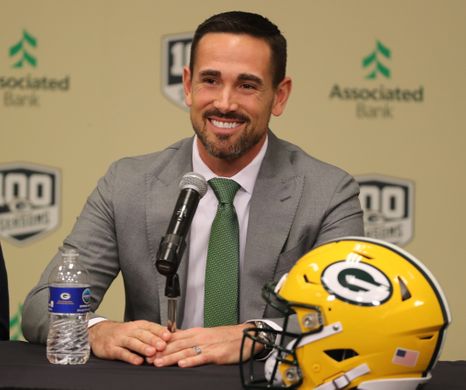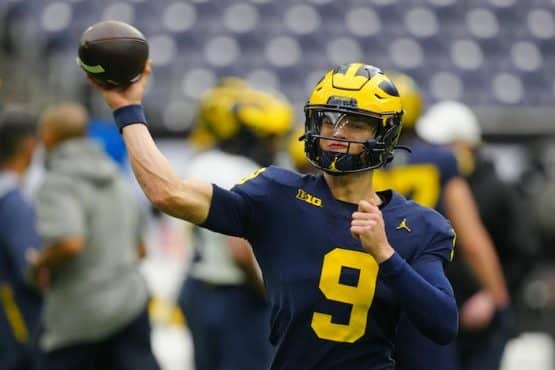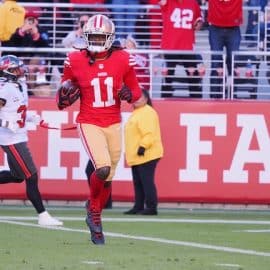Matt LaFleur checked a lot of boxes off when the Packers brass was conducting their coaching search. Part of the Sean McVay/Kyle Shanahan coaching tree? Check. Offensive guru who has worked with and gotten results for elite quarterbacks? Check. But the most important quality that LaFleur possesses that will help him in Green Bay is his proven ability to adapt his offense to fit the personnel he’s working with and the situation that he finds himself in.
If you review LaFleur’s history as an NFL coach, he has found a way to change his offense based on the players he had on his roster and the situation that his team faced.
Look at what happened in Tennessee this season, the only year LaFleur called plays in the NFL. The Titans were looking to run a more aggressive passing offense when the season began. They hired LaFleur away from the Rams in order to bring some of the Los Angeles offensive style to their game plans.
Many Titans players quickly saw the advantages to the offense LaFleur was installing. “Coach LaFleur, he’s just so creative, the way he’s creating things. It’s non-stop, he’s always moving, he’s always thinking of something,” wide receiver Taywan Taylor said during the preseason. “I think with his open mind, he’s going to bring out the best out of all of us. That’s one of the things I just love, how he’s always putting in something and finding something new.”
“He’s willing to adapt and learn, which is really important for anybody, in football or outside of football,” offensive tackle Taylor Lewan said before the preseason opener. “Talking to him, you know he’s got a great football mind. I’m really looking forward to seeing the differences in the play calls this year and how he changes throughout the game and the second half, things to mix up.”
In Week 1, however, the plan got derailed. The Titans offense suffered significant injuries that cost the team three of their most important players. Tight end Delanie Walker, the team’s best receiver, was lost for the season with a broken leg. Receiver was not a strength for the Titans entering the season and their most dangerous weapon and only reliable downfield threat was gone. Lewan left the game with a concussion. Finally, quarterback Marcus Mariota suffered an elbow injury in the second half that would compromise his arm strength and accuracy for the rest of the season. According to LaFleur, Mariota “literally could not throw more than 15 yards.”
So LaFleur had to find a different way to get his offense going. By midseason, he altered the Titans offense to emphasize the running game. Suddenly, Derrick Henry became the focal point of the Titans attack. The Titans went 6-2 and put themselves in a position to make the playoffs if they won their final game. The late-season improvement behind Henry’s dominant running was the payoff for LaFleur’s adjustments.
The truth is that in every stop he’s made, LaFleur has shown adaptability. In Washington, he was quarterbacks coach during Robert Griffin III’s rookie season. RG3 was one of league’s most mobile quarterbacks. He rushed for more than 800 yards and finished the season with a quarterback rating of 102.4. He was named AP Rookie of the Year and selected to the Pro Bowl as he led the Redskins to the playoffs.
In Atlanta, LaFleur coached Matt Ryan, a very different type of quarterback then Griffin. Ryan enjoyed the best season of his career in 2016, winning the league MVP and finishing with a quarterback rating of 117.1, 18 points higher than his previous best. The Falcons reached the Super Bowl and played well in the game.
In Los Angeles, LaFleur helped Jared Goff improve in his second NFL season. Goff’s QB rating increased from a disappointing 63.6 in 2016 to an impressive 100.5 under LaFleur’s tutelage. Goff was 0-7 as a starter as a rookie but went 11-4 during LaFleur’s season as offensive coordinator. The Rams made the playoffs and Goff was selected to the Pro Bowl.
At each stop, LaFleur altered his offense based in part on how he could maximize the talents of the players he had available. Making those adjustments, even midway through a season or a game, was something Mike McCarthy had struggled with in recent seasons. His system remained more or less the same and as a result, the offense stagnated, and Aaron Rodgers lost confidence in McCarthy’s game planning and play calling abilities.
At LaFleur’s introductory press conference, Packers president Mark Murphy said a group of nine players he questioned about what the team needed admitted that “a complacency had set in among some players and coaches.” It is up to LaFleur to eliminate that complacency.
This is LaFleur’s new challenge. He needs to teach a 35-year-old veteran quarterback with two MVPs and one Super Bowl title under his belt a new offense. This will be the first new system Rodgers had to learn since he joined the Packers in 2005.
Rodgers is intelligent, talented and eager to be challenged. The task for LaFleur will be to engage Rodgers and get him and the rest of the Packers to first learn and then buy into his system. If he manages to do this, his tenure in Green Bay should be a successful one.
Add The Sports Daily to your Google News Feed!







